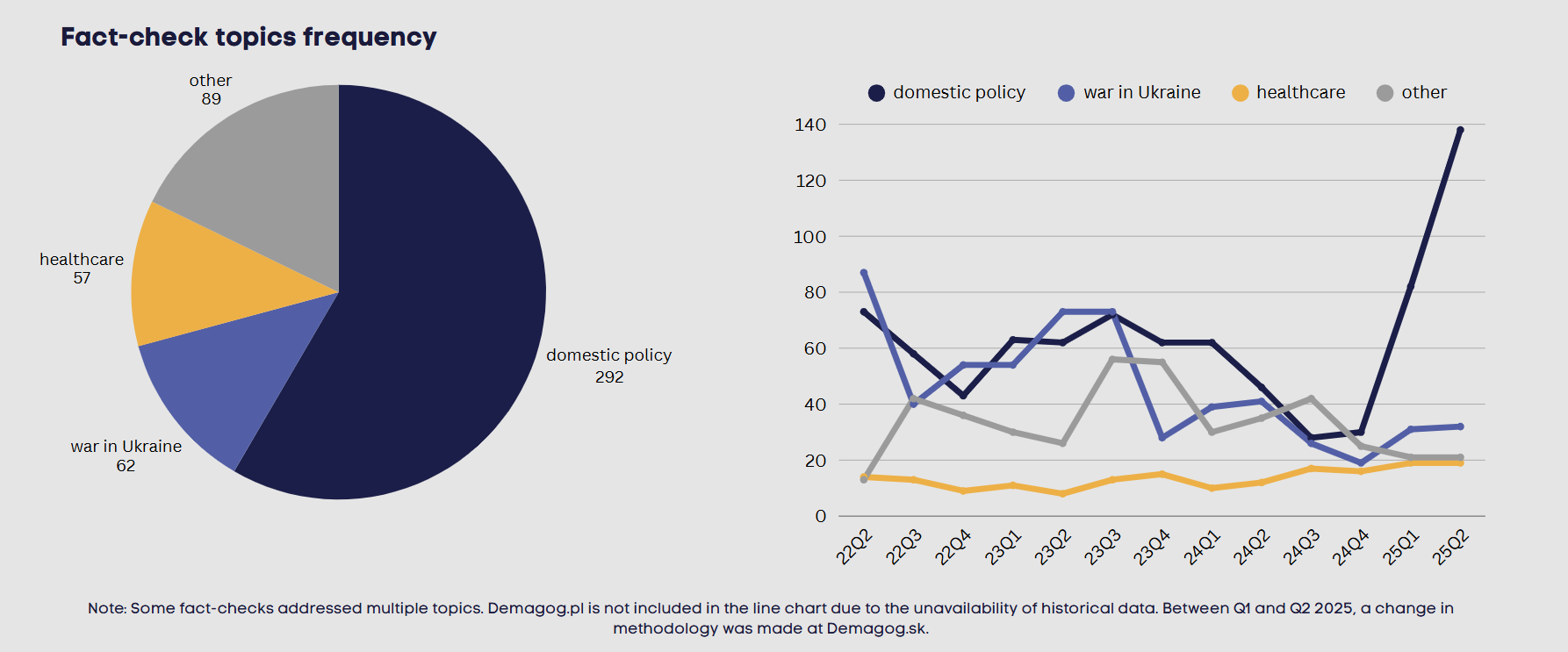
The new edition of the quarterly CEDMO Fact-checking Brief is dominated by domestic politics and elections. Out of 500 articles published on our website by fact-checking organizations, 292 focused specifically on political topics. While the presidential elections in Poland have already concluded, the parliamentary elections in the Czech Republic are imminent. In Slovakia, domestic political issues also resonate strongly in the digital media landscape — particularly those related to the assassination attempt on Prime Minister Robert Fico.
Beyond purely political themes, many false claims have been circulating online regarding migration, vaccines, and Ukrainian President Volodymyr Zelensky. For example, a deepfake video surfaced in the Czech Republic misusing footage of former Health Minister Roman Prymula.
In the fake TV report, ex-minister Prymula warns against COVID-19 vaccination, citing a non-existent study claiming vaccinated individuals had “ominous rubbery formations” in their blood. According to Demagog.cz, Prymula has actually been a long-time supporter of COVID-19 vaccination, stating that serious side effects are rare.

In CEDMO Trends’ longitudinal study, the traditional question about the perception of disinformation revealed that in Q2 2025, Poles were the most concerned. A total of 86% of the adult Polish population saw disinformation as a “very serious” or “serious” problem, compared to 69% in the Czech Republic and 68% in Slovakia. Poles were also more satisfied with the state of democracy in their country in June than their Czech and Slovak neighbors.
According to CEDMO analyst Ivan Ruta Cuker, this is mainly due to long-standing caution. “In May and June, Poland held the first and second rounds of the presidential elections. During election periods, we observe increased activity from the spreaders of false and manipulative infromation, both from domestic and foreign actors. Regarding foreign actors, the dominant effort is to influence elections from the side of the Russian authoritarian regime. Poles have long been very cautious about Russian influence, which likely explains why they increasingly perceive disinformation as a threat — more so than Czechs and Slovaks.”
Among the Czech adult population, the most trusted false claim was that in some countries, there are government programs encouraging children to identify as non-binary or transgender. In total, 35% of Czech respondents found this claim credible. However, only 16% had actually encountered this information in the media.
 In Slovakia, the dominant false information was the narrative that last year’s assassination attempt on Prime Minister Robert Fico was a staged event using blank bullets. This claim was seen by 51% of Slovaks, but only 23% of all respondents found it credible.
In Slovakia, the dominant false information was the narrative that last year’s assassination attempt on Prime Minister Robert Fico was a staged event using blank bullets. This claim was seen by 51% of Slovaks, but only 23% of all respondents found it credible.
“Among the Slovak public, narratives tied to domestic politics often resonate — currently, for example, the version of a staged attack on Prime Minister Robert Fico. This trend may be linked to stronger societal polarization and greater media attention on domestic events, which creates a favorable environment for the spread of conspiracy interpretations. Data from the CEDMO Trends longitudinal study shows that Slovaks generally have a higher tendency to believe in conspiracy theories. One factor may be, simply put, the personality cult that the Slovak Prime Minister is actively and systematically building,” adds Lukáš Kutil from the CEDMO analytical team.

If you are interested in the full results of the second quarterly CEDMO Fact-checking Brief, you can now find it in the relevant section.
CEDMO TRENDS research in the Czech Republic is funded by the National Recovery Plan under project 1.4 CEDMO 1 – Z220312000000 Support for increasing the impact, innovation, and sustainability of CEDMO in the Czech Republic. Data collection in Slovakia and Poland is funded by the National Recovery Plan — project MPO 60273/24/21300/21000 CEDMO 2.0 NPO.
